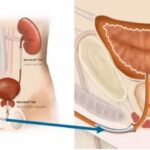
Menopause is a significant phase in a woman’s life marked by various hormonal changes in the body. These changes can have an impact on various aspects of health, including urinary health. Urinary tract infections (UTIs) are a common issue that women may face during menopause due to the hormonal fluctuations that occur during this time. In this blog, we will explore the relationship between menopause, hormonal changes urinary health and discuss the insights from Dr. Rajesh Dhaka, a renowned expert in urology.
Body
Understanding Menopause and Hormonal Changes
Menopause is a natural biological process that marks the end of a woman’s reproductive years. It usually occurs between the ages of 45 to 55, but can vary for each woman. During menopause, the production of estrogen and progesterone, two key female hormones, declines. These hormonal changes can lead to a variety of symptoms, including hot flashes, mood swings and changes in the urinary tract.
Hormonal Changes and Urinary Health
The decline in estrogen levels during menopause can affect the health of the urinary tract in several ways. Estrogen plays a crucial role in maintaining the health of the urinary tract tissues, including the lining of the urethra, bladder and ureters. It helps to keep the tissues pliable, elastic and well-lubricated. However, the reduced levels of estrogen during menopause can lead to thinning and weakening of these tissues, making them more susceptible to infections.
Increased Risk of UTIs during Menopause
The hormonal changes during menopause can increase the risk of developing UTIs. The decline in estrogen levels can result in changes in the urinary tract, making it more susceptible to bacterial infections. The urethra, which is the tube connecting the bladder to the external body, becomes shorter and narrower due to hormonal changes. This can make it easier for bacteria to travel up the urethra and reach the bladder, leading to UTIs.
Common Symptoms of UTIs in Menopause
UTIs can cause a variety of uncomfortable symptoms in menopausal women. These may include a strong and persistent urge to urinate, a burning sensation while urinating, passing small amounts of urine frequently, cloudy, dark, bloody or strong-smelling urine, pain or pressure in the lower abdomen or back, and feeling tired or shaky. It is important to be aware of these symptoms and seek prompt medical attention if they occur, as untreated UTIs can lead to serious complications.
Diagnosis and Treatment of UTIs in Menopause
Diagnosis of UTIs in menopause typically involves a physical examination, medical history review and urine sample analysis. If UTI is confirmed, appropriate treatment options are recommended. Dr. Rajesh Dhaka, an expert in urology, may suggest antibiotics to eliminate the bacterial infection. It is essential to complete the full course of antibiotics as prescribed by the doctor, even if symptoms improve before completing the medication. Along with antibiotics, Dr. Dhaka may also recommend measures to alleviate symptoms and prevent future UTIs, such as drinking plenty of water, emptying the bladder regularly, avoiding irritants like bubble baths or harsh soaps, and practicing good hygiene habits.
Prevention of UTIs in Menopause
Prevention is key in managing UTIs during menopause. Dr. Rajesh Dhaka may provide valuable insights on preventive measures that menopausal women can adopt to reduce their risk of UTIs. These may include maintaining good personal hygiene, drinking plenty of water to flush out bacteria, emptying the bladder regularly, avoiding holding urine for prolonged periods, wiping from front to back after using the toilet, wearing breathable underwear, avoiding irritating feminine hygiene products and discussing with Dr. Dhaka about the potential benefits of hormone replacement therapy (HRT) or other hormonal therapies to manage menopause symptoms and maintain urinary health.
Impact of Lifestyle Choices on UTIs in Menopause
In addition to hormonal changes, lifestyle choices can also impact the risk of UTIs in menopause. Factors such as poor diet, sedentary lifestyle, stress and lack of sleep can weaken the immune system and make the urinary tract more susceptible to infections. Dr. Rajesh Dhaka may provide insights on the importance of maintaining a healthy lifestyle, including a balanced diet, regular exercise, stress management techniques and quality sleep, to support overall health and reduce the risk of UTIs during menopause.
UTI Complications in Menopause
If left untreated, UTIs can lead to serious complications in menopause. Dr. Rajesh Dhaka may provide valuable information on potential complications of UTIs, such as recurrent UTIs, kidney infections, bladder infections and long-term damage to the urinary tract. It is crucial to seek prompt medical attention and follow the recommended treatment plan to prevent these complications and maintain optimal urinary health.
Psychological Impact of UTIs in Menopause
The impact of UTIs in menopause is not limited to physical symptoms alone. UTIs can also have a psychological impact on women, including increased stress, anxiety, and discomfort. Dr. Rajesh Dhaka may provide insights on how the psychological impact of UTIs can affect a woman’s overall well-being during menopause and offer strategies to cope with these challenges, such as stress-reducing techniques, relaxation exercises and seeking support from loved ones and healthcare professionals.
Managing UTIs in Menopause Tips and Strategies
Dr. Rajesh Dhaka may provide practical tips and strategies for managing UTIs in menopause. These may include maintaining good hygiene practices, staying hydrated, emptying the bladder regularly, taking prescribed medications as directed, discussing with Dr. Dhaka about the potential benefits of HRT or other hormonal therapies and adopting a healthy lifestyle to support urinary health during menopause.
Conclusion
In conclusion, menopause brings about hormonal changes in a woman’s body that can impact urinary health and increase the risk of UTIs. It is crucial for women to be aware of these changes and take proactive measures to maintain optimal urinary health during this phase of life. Consulting with an expert in urology, such as Dr. Rajesh Dhaka, can provide valuable insights and guidance on managing UTIs in menopause. By following preventive measures, seeking prompt medical attention when needed and adopting a healthy lifestyle, women can effectively manage UTIs and maintain good urinary health during menopause and beyond.
Note This blog is for informational purposes only and should not be considered a substitute for professional medical advice. Please consult with Dr. Rajesh Dhaka or a qualified healthcare professional for personalized medical guidance.




